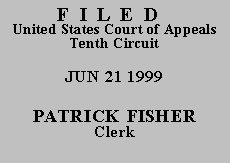

| ANTHONY CROWELL, | |
| Petitioner - Appellant, | |
| v. | |
| NEW MEXICO PAROLE BOARD and ATTORNEY GENERAL OF THE STATE OF NEW MEXICO, | |
| Respondents - Appellees. |
Petitioner is currently incarcerated in a District of Columbia institution where he is serving a prison term imposed by a Virginia state court. He served a portion of his sentence in a New Mexico prison. Petitioner initiated these proceedings by filing a motion pursuant to 28 U.S.C. § 2255 and a motion for leave to proceed in forma pauperis. Among other things, Petitioner argued that he had a due process liberty interest in receiving parole which was violated when his parole date was delayed because he was given an unfavorable report by the Virginia Parole Board for a "New Mexico transferred inmate." R., Doc. 4 at 1. He also claimed that the unfavorable report was due to changes to the parole regulations which made them "stricter" and therefore amounted to a violation of the prohibition against ex post facto laws.
The district court granted Petitioner's motion for leave to proceed in forma pauperis, but it dismissed the case for two reasons. First, because the court had not imposed any conviction or sentence on Petitioner, he was not entitled to relief under 28 U.S.C. § 2255. Second, the court found that even if Petitioner's motion were construed as a 28 U.S.C. § 2241 or § 2254 petition, the court could not grant relief because Petitioner "is incarcerated in the District of Columbia, and a habeas corpus petition must name his warden as respondent." Id. at 2; see 28 U.S.C. § 2242; Rule 2(a), Rules Governing § 2254 cases; Harris v. Champion, 51 F.3d 901, 906 (10th Cir. 1995) (stating that "[t]he law is well established that the proper respondent to a habeas action is the habeas petitioner's custodian"). The court also denied Petitioner a certificate of appealability.
Having reviewed the record and the arguments raised by Petitioner on appeal, we conclude that Petitioner's habeas corpus petition was properly dismissed without prejudice. Petitioner does not attack a sentence or conviction imposed by the district court for the District of New Mexico; he does not attack a conviction or sentence imposed by the State of New Mexico nor does it appear that New Mexico has lodged a detainer against him; and he does not name as a respondent the warden of his current custodian. We therefore deny Petitioner a certificate of appealability and dismiss the appeal.
DENIED and DISMISSED.
Entered for the Court
Monroe G. McKay
Circuit Judge
*. This order and judgment is not binding precedent, except under the doctrines of law of the case, res judicata, and collateral estoppel. The court generally disfavors the citation of orders and judgments; nevertheless, an order and judgment may be cited under the terms and conditions of 10th Cir. R. 36.3.